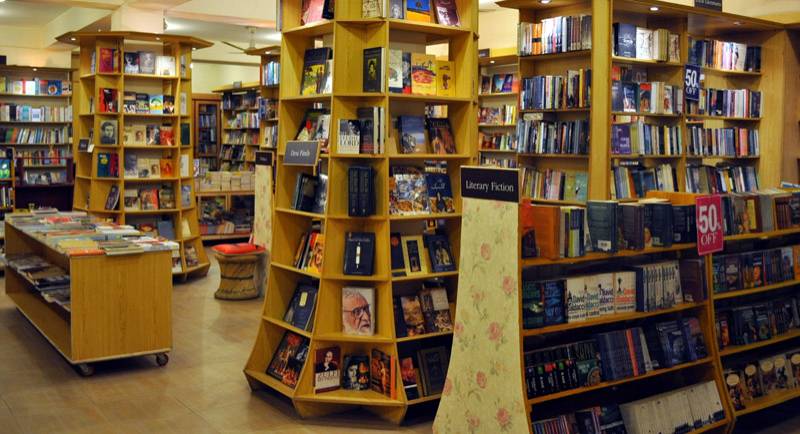
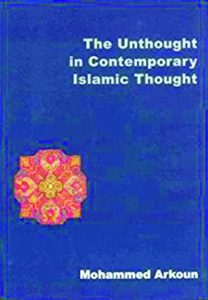
The Unthought In Contemporary Islamic Thought
Mohammed Arkoun
Saqi Books (2002)
Rs5,378
Mohammed Arkoun is one of the Muslim world’s foremost thinkers. His efforts to liberate Islamic history from dogmatic constructs have led him to a radical review of traditional history.
Drawing on a combination of pertinent disciplines - history, sociology, psychology and anthropology - his approach subjects every system of belief and non-belief, every tradition of exegesis, theology and jurisprudence to a critique aimed at liberating reason from the grip of dogmatic postulates.
By treating Islam as a religion as well as a time-honoured tradition of thought, Arkoun’s work aims at overcoming the limitations of descriptive, narrative and chronological modes in history by recommending that the entire development of Islamic thought - from Quranic to present-day fundamentalist discourses - be subjected to a critical analysis guided by these categories.
The expected outcome of such a strategy is an emancipated political reason working hand in hand with a truly creative imagination for a radical re-construction of mind and society in the contemporary Muslim world.
Mohammed Arkoun was one of the Muslim world’s foremost thinkers. He passed away in Paris in 2010. In a career of more than 30 years, he was an outstanding research scholar, a searching critic of the theoretical tensions embedded in the field of Islamic Studies, and a courageous public intellectual, carrying the banner of an often embattled Islamic modernism and humanism.
A native of Great Kabylia, Algeria, he studied at the Faculty of Literature of the University of Algiers and at the Sorbonne in Paris.
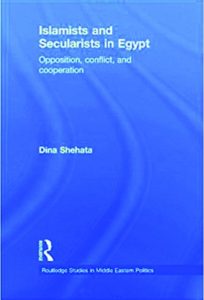
Islamists and Secularists in Egypt: Opposition, Conflict & Cooperation
Dina Shehata
Routledge (2010)
Rs10,756
In a detailed analysis of the continued survival of authoritarian governments in the Arab world, this book uses Egypt as a case study to address the timely and complex issue of democratization in the Middle East.
This book examines how relations between different actors in the Egyptian opposition have contributed to the endurance of authoritarianism in Egypt over the past three decades. The author argues that the longevity of the authoritarian government is not only a function of the strength and cohesion of the regime, but is also related to the weaknesses and divisions between opposition groupings, particularly between Islamists and non-Islamists. Looking at how such ideological differences and mobilizational asymmetries have impeded successful cooperation between different opposition groups, and how this allows the authoritarian regime to successfully ensure its continued hegemony, the author illustrates the extent to which opposition strategies profoundly affect successful transitions to democracy in the Arab world.
Highlighting the main obstacles to democratic political reform in the region, the author provides important insights for the promotion of democracy in the region which will be a valuable addition to the literature on Middle Eastern politics and government.
Dina Shehata is a researcher at Al-Ahram Center for Political and Strategic Studies. Her current research focuses on opposition parties and movements in Egypt and the Arab world. She holds a PhD in Comparative Politics from Georgetown University.
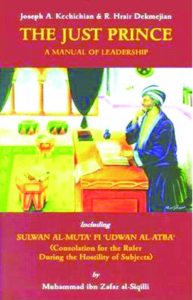
The Just Prince: A Manual of Leadership
Joseph A. Kechichian & R. Hrair Dekmejian
Saqi Books (2003)
Rs4,602
The Sulwan al-Muta’ is an 800 year-old handbook for statesmen written by a Sicilian Arab who addressed this advice for a “just prince” based on Islamic morality, European realism and a broad-ranging knowledge of different cultures. The work is explicated using straight philosophical discourse as well as the narrative whirl of fables-within-fables so beloved of ancient and mediaeval Oriental literature. This is a work of practical political philosophy that combines penetrating contemporary analysis, the entertainment value of The Thousand and One Nights, and the deep insight of Sun Tzu.
Joseph A. Kechichian is a private consultant on national security affairs within the Gulf Cooperation Council (GCC).
- Hrair Dekmejian is Professor of Political Science at the University of Southern California.
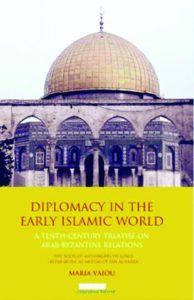
Diplomacy in the Early Islamic World: A Tenth-Century Treatise on Arab-Byzantine Relations
Maria Vaiou
I.B.Tauris & Co Ltd (2015)
Rs10,449
Arab messengers played a vital role in the medieval Islamic world and its diplomatic relations with foreign powers. An innovative treatise from the 10th Century (“Rusul al-Muluk”, “Messengers of Kings”) is perhaps the most important account of the diplomacy of the period, and it is here translated into English for the first time.
“Rusul al-Muluk” draws on examples from the Holy Qur’an and other sources which extend from the period of al-jahiliyya to the time of the ‘Abbasid caliph al-Mu’tasim. In the only medieval Arabic work which exists on the conduct of messengers and their qualifications, the author Ibn al-Farr rejects jihadist policies in favor of quiet diplomacy and a pragmatic outlook of constructive realpolitik. “Rusul al-Muluk” is an extraordinarily important and original contribution to our understanding of the early Islamic world and the field of International Relations and Diplomatic History.
“Dr Vaiou succinctly characterizes the text’s nature and purpose… although her approach is primarily that of a historian, Vaiou provides full coverage of the treatise’s rich cultural background... The text will be of very great interest to historians of Islam, both cultural and political historians, and also to Byzantinists and medievalists in general,” writes Dr Jonathan Shepherd of Oxford University.
Maria Vaiou is Post-doctoral Research Fellow in Byzantine History at Sabanc University, Istanbul. She completed her PhD at the University of Oxford.
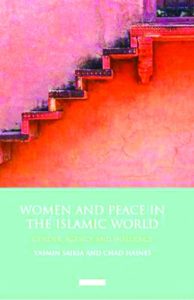
Women and Peace in the Islamic World: Gender, Agency and Influence
Eds Yasmin Saikia & Chad Haines
I.B.Tauris & Co Ltd (2014)
Rs10,449
How realistic is the prospect of peace in the Muslim world? This question is the predominant focus for global analysis today, but its debate frequently ignores the cultural and social complexity of the Muslim world, reducing it into a system of states and select actors. This book addresses such a failing by exploring how the everyday interactions of women, in accordance with Islamic personal ethics, can offer the world a new interpretation of peace.
In particular, it focuses on the women in Islamic societies, from Aceh to Bosnia, Morocco to Bangladesh, initiating a dialogue on the role of these women in peacemaking. This concentration on the complex issues of the everyday both enables a detailed exploration of how people conceptualise peace and opens up new frameworks for conflict resolution. The discussions that emerge lead to a critical questioning of assumptions about peace as a state policy and cessation of violence.
Drawing upon original research from different parts of the Middle East, North Africa and Asia, including Iran, India, Afghanistan, Bangladesh, Bosnia, Egypt and Sudan, the contributors offer a refreshing new look at Muslim women as peacemakers, challenging any assumptions of Islam as an inherently violent religion. Such a timely work provides new and important analyses on the role of Muslim women in forging new pathways of peace in the contemporary world.
“This is a remarkable collection. The editors deserve special praise for bringing together a divergent set of perspectives that trace the way in which Muslim women on a global level are working to bring about peace not as a distant goal but as an everyday path here and now. Highly recommended for all students of Islamic thought, women and Islam, and everyone interested in how religion can serve as a tool for creating a just and peaceful world,” writes Omid Safi, Duke University, Director of Islamic Studies.
Ziauddin Sardar, author of Mecca: The Sacred City and Editor of Critical Muslim, adds: “An important and timely contribution on the vital issues of gender and what we all yearn for – concord and harmony.”
Professor Yasmin Saikia is the Hardt-Nickachos Chair in Peace Studies at the Center for the Study of Religion and Conflict and a Professor of History in the School of Historical, Philosophical and Religious Studies. Her research and teaching interests invoke a dynamic transnational and interdisciplinary dialogue situated at the intersection of history, culture, and religion. With a specific focus on contestations and accommodations in South Asia between local, national, and religious identities, she examines the Muslim experience in India, Pakistan, and Bangladesh, and the discourse of nonviolence alongside the practice of violence against women and vulnerable groups.

